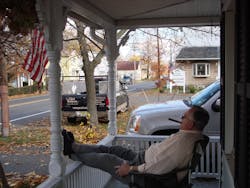Carter: The Importance of Knowledge
Many have been the occasions during my career when I held myself up to you as a spokesman for wisdom and enlightenment. Many times I have tried to take the moral high ground as I sought to discuss my feelings about sharing, knowledge with others via the use of teaching others and learning more myself. A number of my friends and I have committed our careers and lives to sharing the knowledge that others cared enough to share with us. Unshared knowledge is a gift which dies unused.
Let me share a bit of history for you younger troops. There was a quotation made famous in a movie favorite of mine, the 1978 comedy, Animal House. This thought expresses my feelings toward knowledge. The quotation “Knowledge is good," was located on the statue honoring Emil Faber, the founder of Faber College. What a simple way to frame an elegant thought. As a matter of fact I can remember when Engine Company 11 in Newark ordered a company t-shirt which had this statement on the back of it.
Let me suggest to you that knowledge makes us all richer, and in some cultures, it is a treasure hoarded by the ambitious. They believe that knowledge is power. They devoutly believe that the more of something like knowledge that a person possesses, which others do not have, the stronger will be their control over society. Consequently, such people do not share their knowledge.
In many fire departments, the chief or training officer takes advantage of current publications, conferences and training materials, gaining wisdom and knowledge. Sadly, in some departments, these officers hog all opportunities for gaining knowledge rather than sharing these sources with others. They grow to know more about the inner workings of their profession than their peers. They bask in the glow of their superior knowledge, working hard to maintain that superiority by depriving others. When it serves their purposes, they dole out knowledge in small bits and piece, managing never to share the bulk with their people. This is more than sad. It is dangerous.
I remember a fire department where a good, working library was created in the training division. New books were cataloged and placed on the shelves. Unfortunately, these books were stored behind the locked gates of one individual’s approach to knowledge dissemination. There was the worry that someone would steal the books. So not only were the books locked up, they were never loaned out.
To me this always seemed to be a most negative thing indeed. I swore that if I were ever in a similar circumstance, I would encourage the transmission of knowledge in every way possible. There came a time when I ascended to that position. As the commandant of training, I was charged with ministering to the educational needs of a major metropolitan fire department.
To that end, I set the genie of knowledge free. There were no locks on our library, and I encouraged people to borrow books. I also encouraged them to borrow our videos and movies. I am not naive; I realized that there may be those people who covet our knowledge sources. But it was always my philosophy that sharing was better than hoarding. People could have whatever they wished, as long as they signed the lending library sheet in my office.
Back then I also sought to alter the direction of training in our department. As a further sign of where our department was headed, I sought to move training out of the fire academy and into the city at large. I worked to develop a new delivery system that involved four battalion-level training sites and the creation of a battalion training officer in each of our field battalions. My battalion training site scheme was designed to deliver a new series of drills created by the staff. This scheme also delivered specialized courses.
Rather than taking people away from their areas of operational responsibility, the scheme allowed them to be available for emergencies in their home districts. Lastly, the staff will work to ensure that people are training to standard. My new motto became “Knowledge is portable, move some around.”
There you have it – one person’s view of training and knowledge. Think about this view when someone asks you about the importance of training. Who knows? It might help you fight for better training in the face of raging budget cutters.
